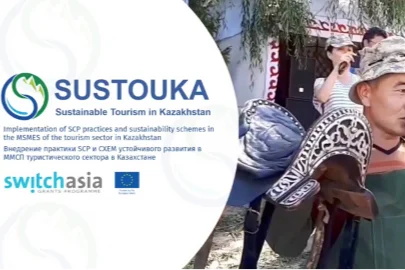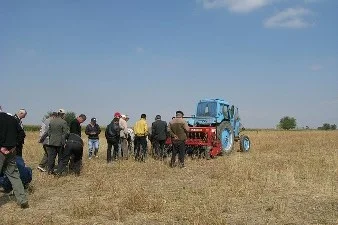SUSTOUKA – Making Sustainable Tourism A Reality in Kazakhstan

Kazakhstan, the largest country in Central Asia and the ninth largest in the world, offers immense potential for sustainable tourism, including nature and eco-tourism. This sector provides significant economic opportunities for the Kazakh people and supports the country’s transition towards a green economy, aiding in the achievement of UN Sustainable Development Goals (SDGs).
Sustainable tourism in Kazakhstan is particularly aligned with SDG 8 (promoting sustained, inclusive, and sustainable economic growth, employment, and decent work for all), SDG 12 (ensuring sustainable consumption and production patterns), SDG 14 (conserving and sustainably using oceans, seas, and marine resources for sustainable development), and SDG 15 (protecting, restoring, and promoting sustainable use of terrestrial ecosystems, sustainably managing forests, and halting biodiversity loss). However, the sector currently faces challenges such as inadequate transport infrastructure, complex visa regimes, limited tourism product appeal, low tourism standards, a shortage of skilled workers, limited financial sector understanding of tourism, and weak branding and destination management.
In response to these challenges, the EU-funded SWITCH-Asia SUSTOUKA project was launched in 2020. This project promotes sustainable consumption and production (SCP) practices and sustainable development schemes in MSMEs operating in Kazakhstan’s tourism sector. It is implemented by an international and multidisciplinary consortium including EKOTEK (Spain, coordinator), the Kazakhstan Tourism Association (KTA), the Kazakhstan Association of Hotels and Restaurants (KAGiR), and ECEAT (Netherlands).
On February 23, 2021, a round table was organized to discuss the development of Kazakhstan’s tourism industry with a focus on environmental preservation, cultural identity, and adapting the Travelife certification program to the country’s needs. The meeting included experts, specialists, and stakeholders from various fields and was divided into three sessions covering:
- Opportunities for developing tourism while preserving the environment
- Maintaining the authenticity of tourist products
- Improving work standards and adapting European standards to Kazakhstan’s market
- Developing and implementing environmental standards
- Raising awareness and promoting tourism culture
- Increasing services for people with disabilities
- Adapting the Travelife sustainability certification system to Kazakhstan
Kazakhstan’s tourism strength lies in its natural and cultural heritage, as well as its historical assets. During the meeting, stakeholders considered all necessary elements to promote the country as a sustainable tourism destination for both local residents and foreign tourists. The discussion also highlighted the importance of making the tourism sector appealing to local residents without disrupting their usual way of life. The event concluded with a consensus that sustainable tourism is essential for both the people and the planet. Sustainable development aims to use resources in a way that allows them to regenerate fully, ensuring future generations have access to the same resources we enjoy today. Through the promotion of SCP in tourism, the SUSTOUKA project is actively working towards this objective.
 Albania
Albania Algeria
Algeria Andorra
Andorra Argentina
Argentina Armenia
Armenia Australia
Australia Austria
Austria Azerbaijan
Azerbaijan Bahrain
Bahrain Belgium
Belgium Bolivia
Bolivia Brazil
Brazil Bulgaria
Bulgaria Cambodia
Cambodia Cameroon
Cameroon Canada
Canada Chad
Chad Chile
Chile China
China Colombia
Colombia Costa Rica
Costa Rica Croatia
Croatia Cyprus
Cyprus Czechia
Czechia Denmark
Denmark Ecuador
Ecuador Egypt
Egypt Finland
Finland France
France Georgia
Georgia Germany
Germany Ghana
Ghana Greece
Greece Hungary
Hungary Iceland
Iceland India
India Indonesia
Indonesia Ireland
Ireland Italy
Italy Jamaica
Jamaica Japan
Japan Jordan
Jordan Kazakhstan
Kazakhstan Kenya
Kenya Kuwait
Kuwait Latvia
Latvia Lebanon
Lebanon Libya
Libya Lithuania
Lithuania Luxembourg
Luxembourg Malaysia
Malaysia Maldives
Maldives Mali
Mali Malta
Malta Mexico
Mexico Moldova
Moldova Monaco
Monaco Morocco
Morocco Netherlands
Netherlands New Zealand
New Zealand Nigeria
Nigeria North Macedonia
North Macedonia Norway
Norway Oman
Oman




